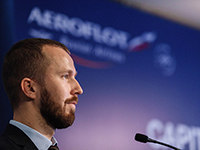The $7 bn inflow of foreign direct investment into Russia during the first quarter of 2017 was ‘the best number for the corresponding period in the past three years,’ President Vladimir Putin told the St Petersburg International Economic Forum in June last year – and this was no fake news. Having suffered the effects of economic sanctions following the country’s invasion of Ukraine and annexation of Crimea in 2014, a volatile ruble and a big drop in oil prices, the Russian economy has been making a comeback.
In fact, according to the 2017 Growth Barometer report by EY, published in September 2017, the country has returned to a position where it can start focusing on the future again. ‘Russian people are going back to normal life, they are starting to consume more and the overall growth of the economy is creating the feeling that companies can be successful again,’ says Alexander Ivlev, managing partner at EY Russia, in the study.
An ill wind
And while there’s no doubt that IR professionals from Moscow to Vladivostok will be relieved to be feeling the effects of stability and GDP growth on Russia’s economy, the difficult times have – paradoxically – brought benefits to IR.
‘The work of [Russian] IROs has become significantly more challenging in the context of geopolitical tensions,’ says Victoria Voronikova, head of sales for primary market equities at Moscow Exchange (Moex). These elements all add new challenges to the day-to- day concerns of Russian IROs – ‘particularly those at state-owned companies or companies in the more ‘politicized’ sectors’ – but, Voronikova adds, ‘a lot of IROs and companies have really risen to the challenge.’ And the results are starting to show.
|
Andrey Napolnov, |
One example Voronikova offers is Sberbank, which she says ‘has maintained a proactive IR stance and strong relationships with the international investor community, which has helped support very strong share price performance.’
Sberbank was also the fourth-highest riser in IR Magazine’s 2017 Euro Top 100, climbing 206 places from the previous year to sit in joint 61st place. Another Russian firm to get a nod at the IR Magazine Awards – Europe 2017 was Aeroflot, whose head of investor relations Andrey Napolnov was short-listed for the rising star award.
A few months later, EN+ (the hydropower-to-aluminum group owned by oligarch Oleg Deripaska) listed in London – a market that was once first choice for Russian companies seeking an international listing but which had seen a number of firms actually de-list since the invasion and annexation of Crimea. Although London had hosted an £800 mn ($1.1 bn) secondary listing for gold producer Polyus in June 2017, the EN+ IPO was the first major, primary listing since 2014 – and was seen by many as a test of international investor sentiment toward Russia.
A young profession
All these elements are signs of an IR community rapidly gaining ground. This fast pace of change is not so surprising, however.
‘It’s important to remember that the Russian capital market – and thus the IR profession in Russia – is only about 20 years old,’ points out Anton Terentiev, head of investor relations at Moex. ‘Over those two decades, the role of IR has been completely transformed from one of providing basic data in the early days to a far more comprehensive and strategic role today.’ In fact, Terentiev says that today, the mandate for a Russian IR professional is very similar to that of one operating in a western, developed market.
Although Moex is a listed company with its own shareholders, it is also instrumental in everything from IPOs to promoting good corporate governance. And as the number of Russian listings in London has dropped, the number of companies going public at home has increased, explains Terentiev. Infrastructure upgrades at the exchange mean companies listing in Moscow have access to the same institutional investors as they would have in London, he says, as well as ‘superior liquidity and better bid-ask spreads’ than in London.
‘The value of equity capital-raisings held on Moex in 2017 is up nearly twofold compared with 2016 and threefold compared with 2015,’ Terentiev continues. Recognizing these changes, ‘MSCI has started to select local Russian shares over corresponding DRs for inclusion in its indexes.’
|
Victoria Voronikova, |
Moex has also been busy promoting investor relations through its IR Academy, launched in 2016 (see Academy of IR, below), while corporate governance has gone from ‘atrocious to pretty good,’ says Terentiev. ‘Senior management and controlling shareholders of Russian companies have come to recognize the importance of proper corporate governance for share price performance, and have executed significant improvements in this area, albeit at varying paces.’
Free float value
But another element here is the free float level, adds Napolnov. The extent of IR involvement in financial decision-making and strategy is ‘all linked to whether or not shareholder value is really important for the company or not,’ he says. ‘In some western countries where there are many companies that have a really high free float with almost all shares sometimes being owned by institutional investors, management will definitely see shareholder value as a key priority.’
Aeroflot itself is majority-owned by the Russian Federation but has a free float of 45.2 percent. Napolnov says shareholder value is absolutely important to management and ‘is one of the KPIs for the executive board and the board of directors’. Aeroflot is also the leading airline of the world’s largest country, however, and has obligations that extend beyond shareholder value. ‘As such we need to promote social mobility and take on projects that, while socially important, from an investor perspective may not necessarily lead to significant value creation,’ Napolnov adds.
Despite this, and despite the challenging environment IROs have been working in over recent years, Napolnov says that, overall, investors stuck with the company through 2014 and 2015. And while he concedes that some avoided the market due to volatility and that skepticism over Russia increased, Aeroflot actually asked investors in its annual perception study how geopolitics impacts their investments. For a number of years the company has asked ‘whether the geopolitical situation between Russia and western countries affects investment or rating decisions of Aeroflot in particular,’ explains Napolnov. ‘Most participants (more than 60 percent or 70 percent) say there is no impact.’
That doesn’t mean Aeroflot didn’t look to broaden its horizons, however, adding new Asian and Middle Eastern investors to the schedule. ‘We are a growing company, with a compelling investor case, and I believe there will always be names that are interested in fast- growing companies,’ says Napolnov. ‘The question is always about risk and return.’
The Russian IR evolution
Aeroflot, Sberbank, EN+, Moex: these are all companies leading the way in the next phase of Russian investor relations. And they all recognize that the volatility they’ve been tackling in recent years has had benefits for the profession.
As well as the obvious geopolitical tensions, ‘a noteworthy theme in the last five years is that the Russian economy, and thus many of our listed businesses, are no longer growing at the rapid pace they once were,’ says Terentiev. ‘This has forced IR to raise the bar and effectively communicate company strategy in this new, slower-growth environment.
‘[But] every episode of volatility triggers a reassessment of the long-term investment story in order to check whether it remains intact or has changed. In effect, investors keep applying extra scrutiny to management and IR professionals. This leads to a gradual, evolutionary development of the financial markets – which is a healthy process.’
|
Academy of IR In September 2016 Moscow Exchange (Moex) launched its IR Academy, a one-year program for investor relations and corporate communications specialists (as well as analysts) to go over everything from the basics to advanced IR. At time of writing, the program had hosted 11 seminars – more or less one a month – starting with something more akin to an introduction to IR and aimed really at ‘junior IROs from large-cap companies and senior IROs from mid and small-cap companies,’ explains Victoria Voronikova, head of sales for primary market equities at Moex. Since launching, the academy has ‘evolved into more of a discussion club of interesting cases and is becoming a center for developing professional guidelines and standards for IROs,’ adds Anna Vasilenko, managing director for primary markets at Moex. Attendee numbers and seniority have both increased, with the seminars – geared as free-flowing discussions rather than lectures – ‘now visited by Russia’s most senior IROs and CFOs’, while topics have also evolved to incorporate all the hot trends, from ESG to Mifid II. |
This article appeared in the spring 2018 issue of IR Magazine









